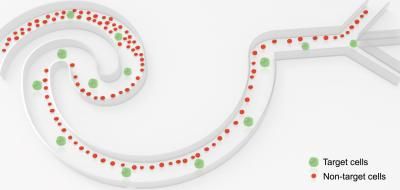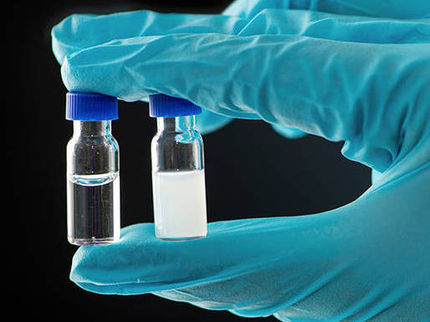Flowing cells in a wavy microchannel for effective size-based cell sorting
Nearly half a century ago scientists have noticed an interesting phenomenon that small particles flowing through a long tube can stay at a specific position along the cross-section of a tube. This is known as inertial focusing. Later, along with the development of microfluidic technology in recent decades, inertial focusing (one type of passive microfluidic manipulation technology) has emerged as one of the most powerful and precise cell manipulation techniques, exhibiting immense commercial potentials in the bioengineering and pharmaceutical industries. Assistant Professor Dr Ye Ai's research team from the Singapore University of Technology and Design (SUTD) recently developed a novel, credit card sized inertial cell focusing and sorting microfluidic device with a channel of 125 μm wide (roughly half of a single fingernail's thickness), providing the potential of rare cell isolation from complex clinical samples.

This is a schematic of size-based inertial cell sorting in a wavy channel unit before the trifurcated output. Differently sized biological cells can achieve distinct focusing behaviors, which thus result in effective size-based separation between target cells and non-target cells.
SUTD
Currently cancer is becoming one of the leading causes of human death. One of the major difficulties towards achieving radical cure in cancer is due to malignant metastasis, which directly causes overwhelming obstacles in therapeutic management and early diagnosis. The ability to isolate rare circulating tumor cells (CTCs), the seeds for cancer metastasis, enables much less invasive approach for cancer diagnosis and prognosis. New microfluidic technologies for high throughput, high accuracy cell sorting of complex biological samples are highly sought after to address the challenge in rare cell isolation.
In this research, Dr Ai's team presented a novel inertial focusing and sorting device with a series of reverse wavy channel structures consisting of semi-circular sections that generate a periodically reversed hydrodynamic flow perpendicular to the main flow direction. The balance between two kinds of hydrodynamic forces resulted in a size-dependent lateral particle movement across the channel, which finally achieved size-based separation of target cells from non-target cells. The principal investigator, SUTD's Dr Ai said: "Compared to active methods, the passive inertial focusing with the use of hydrodynamic forces exhibit the merits of a simplified setup, high-throughput and low-energy consumption. Moreover, the linear array of these repeated wavy channel units also facilitates easy horizontal (2D) and vertical (3D) parallelization of multiple channels, which provides great potential for high-throughput cell sorting in practical biomedical applications." The team has applied the developed sorting technology for high-throughput isolation of cancer cells from whole blood samples.
Original publication
Yinning Zhou, Zhichao Ma & Ye Ai; "Sheathless inertial cell focusing and sorting with serial reverse wavy channel structures"; Microsystems & Nanoengineeringvolume; 2018
Most read news
Original publication
Yinning Zhou, Zhichao Ma & Ye Ai; "Sheathless inertial cell focusing and sorting with serial reverse wavy channel structures"; Microsystems & Nanoengineeringvolume; 2018
Topics
Organizations
Other news from the department science

Get the life science industry in your inbox
By submitting this form you agree that LUMITOS AG will send you the newsletter(s) selected above by email. Your data will not be passed on to third parties. Your data will be stored and processed in accordance with our data protection regulations. LUMITOS may contact you by email for the purpose of advertising or market and opinion surveys. You can revoke your consent at any time without giving reasons to LUMITOS AG, Ernst-Augustin-Str. 2, 12489 Berlin, Germany or by e-mail at revoke@lumitos.com with effect for the future. In addition, each email contains a link to unsubscribe from the corresponding newsletter.





















































